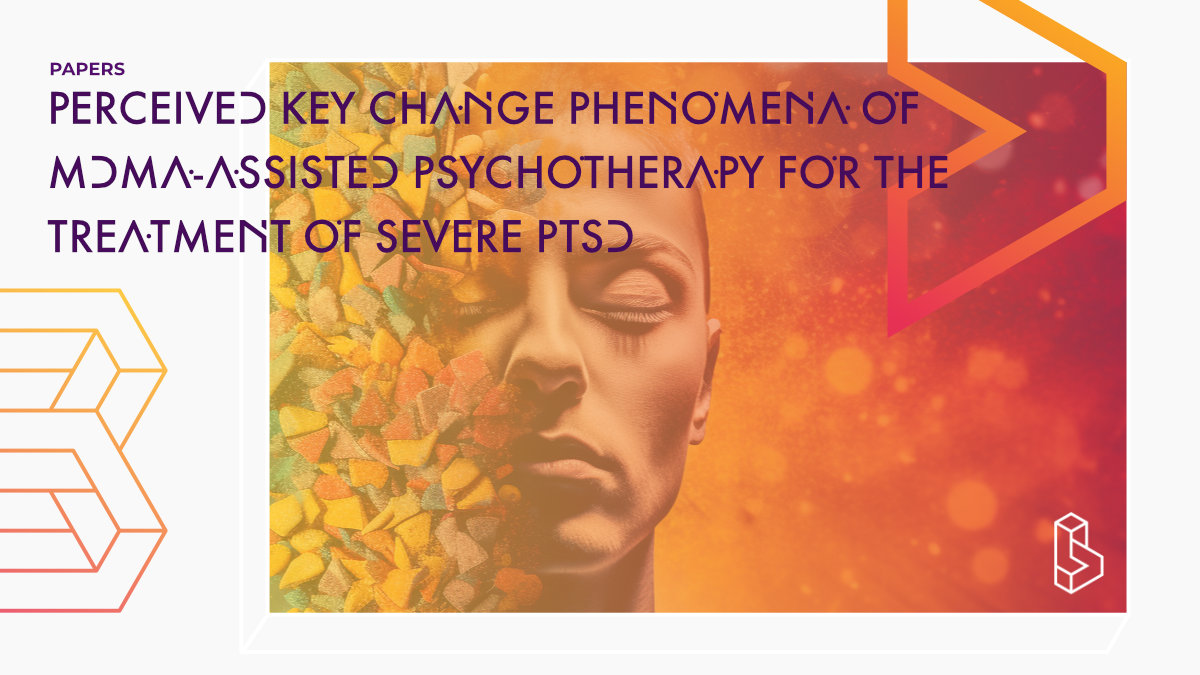This qualitative study (n=7) utilized Interpretative Phenomenological Analysis (IPA) to investigate the experiences of patients with severe PTSD participating in a Phase-II clinical trial assessing MDMA-assisted psychotherapy. The analysis of four recorded & transcripted integrative sessions per participant provided real-life statements reflecting perceived mechanisms of change and how these integrated into their daily lives, complementing and clarifying the quantitative data.
Abstract of Perceived key change phenomena of MDMA-AT for severe PTSD
“Post-traumatic stress disorder (PTSD) is a prevalent psychiatric condition that significantly impacts daily functioning in patients but lacks adequate treatment options. 3,4-methylenedioxymethamphetamine (MDMA) as an adjunct to psychotherapy for the treatment of PTSD has been studied increasingly for the last two decades and has shown promising results through quantitative data. However, few qualitative studies have been conducted to investigate patients’ experiences who participate in these trials. This study intends to complement and clarify the quantitative findings resulting from a Phase-II clinical trial for assessing the safety and efficacy of MDMA-assisted psychotherapy for PTSD by using a qualitative approach based on available material of 4 recorded and transcripted integrative sessions per participant. An Interpretative Phenomenological Analysis (IPA) was conducted for 7 participants who met criteria for severe PTSD to develop a deeper understanding of the treatment and its efficacy. Analysis results provided real-life statements from participants that reflect perceived mechanisms of change and showed to what extent their proposed working mechanisms integrate into daily life.”
Authors: Macha Godes, Jasper Lucas & Eric Vermetten
Summary of Open Label Multi-Site Study of Safety and Effects of MDMA-assisted Psychotherapy for Treatment of PTSD
Post-traumatic stress disorder (PTSD) is an impairing anxiety disorder marked by re-experiencing phenomena, affect dysregulation, hypervigilance, and fear and avoidance associated with recalling traumatic memories.
MDMA-assisted psychotherapy (MDMA-AT/AP) has regained interest as a promising therapy for severe therapy-resistant PTSD. This study explores how participants experience change and processing of trauma after undergoing MDMA-AP by assessment of recorded clinical integration sessions.
Find this paper
https://doi.org/10.3389/fpsyt.2023.957824
Open Access | Google Scholar | Backup | 🕊
Cite this paper (APA)
Godes, M., Lucas, J., & Vermetten, E. Perceived Key change phenomena of MDMA-Assisted Psychotherapy for the treatment of severe PTSD: An Interpretative Phenomenological Analysis of Clinical Integration Sessions. Frontiers in Psychiatry, 14, 957824.
Authors
Authors associated with this publication with profiles on Blossom
Eric VermettenEric Vermetten is Professor of Medical-Biological and Psychiatric Aspects of Psychotrauma at the University of Leiden.
Compound Details
The psychedelics given at which dose and how many times
MDMA 80 - 120mg | 3x
Linked Clinical Trial
Open Label Multi-Site Study of Safety and Effects of MDMA-assisted Psychotherapy for Treatment of PTSDThis multi-site, open-label, Phase 2, lead-in study assesses the safety and effect of 3,4-methylenedioxymethamphetamine (MDMA)-assisted therapy in participants diagnosed with at least severe posttraumatic stress disorder (PTSD). Therapy teams that have been identified and trained to work on the sponsor's planned Phase 3 studies will treat at least one open-label participant in this study.

